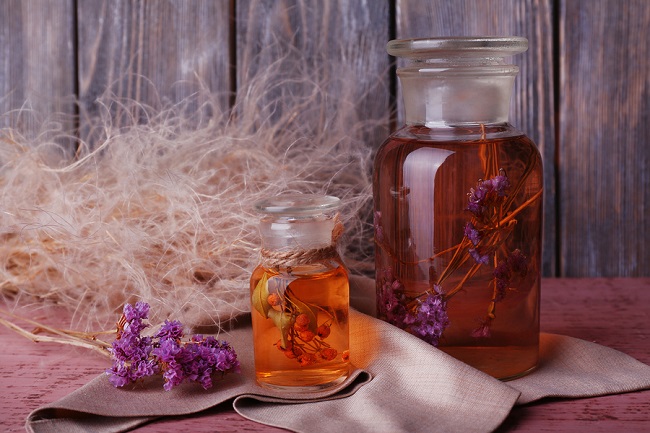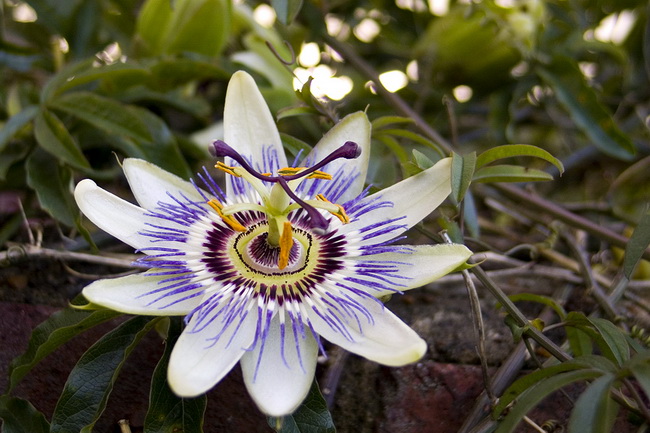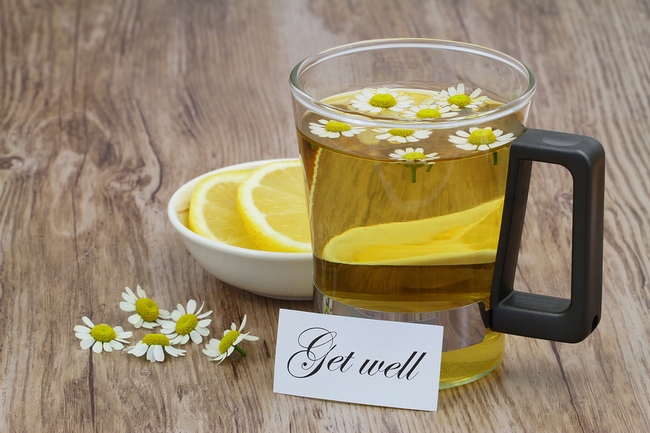- Make It Yourself Lavender Heart-Shaped Bath Bombs!
- 20 Things You Never Knew About “Down There”
- 12 Best Foods For Those Suffering From Arthritis Pain
- 12 Personal Hygiene Mistakes Almost Everyone Makes (Mom Never Told You About #4!)
- 15 Medicinal Plants And Herbs From The Cherokee People
- 12 Mind-Blowing Benefits Of Drinking Coconut Water During Pregnancy
- 12 Outstanding Winter Foods That Won’t Fatten You Up Like A Christmas Turkey
Make Your Own Herbal Tinctures for Anxiety and Stress Relief

Photo credit: bigstock.com
At one time or another in a person’s life, we are going to feel stress and anxiety. In today’s modern world, the pressure really seems to be on to do more and to do it faster than ever before. If you or someone you love feels anxious, tense, nervous, or exhausted, these are all signs of an overwhelmed nervous system.
Using herbal tinctures can help to treat and relieve some of these symptoms. Of course, they aren’t a cure-all. You still need to eat a healthy, natural, nutritious diet and get plenty of both sunshine and sleep. However, most people find that herbal tinctures can really help aid their bodies during times of need. These aren’t meant to be taken every day for the rest of your life, but rather during times when you feel your body needs a little extra help.
Most tinctures are made to be taken simply by placing a few drops under the tongue. However, if you find the taste not to your liking, you can always mix it in a glass of water or juice.
If you are feeling overwhelmed, anxious, or tense, even if you really can’t place the reason why, you can still benefit from herbal tinctures.
First we will give you a list of herbs that are known to help with feelings of anxiety. Some work in slightly different ways than others, so read through them and find the ones that seem to work best for you or that seem to suit your particular problem. Afterwards, we will explain how to take the herbs of your choice and make your own tincture.
Always consult your doctor before starting any herbal program, especially if you are taking any prescription drugs to avoid possible drug interactions. Although the herbs listed below are considered safe, everyone is different and everyone reacts differently. Never consume herbs if you are pregnant or nursing unless you consult with your doctor first.
1. California Poppy
This flowering herb is often used to treat insomnia and relax tension. This is one of the oldest and most effective remedies for treating anything that might be stress related. Low doses of California poppy are terrific for everyday stress or feelings of anxiety, while higher doses have a strong sedative effect that works well from those suffering from insomnia. If you are going through an intensely stressful situation and find you can’t sleep because your mind won’t shut off, this might be the perfect herbal solution for you.
2. Alfalfa
This is a super nutritious herb that contains tons of vitamins and minerals that it pulls deep from within the earth, deeper than any other herb. When we are under stress, it depletes the body of nutrients and alfalfa can replace what has been lost. This herb is perfect to use as an addition to other herbs.
Continue to Page 2

Photo credit: bigstock.com
3. Passion Flower
This is an herb that is well known to help induce deep and restful sleep. It has been used by Native Americans for untold centuries to stop anxiety and seizures. If you find you have difficulty sleeping due to anxiety issues, passion flower should work well for you. Read the labels on any herbal tonic that says it helps to induce sleep and you will most likely find passion flower in the list of ingredients.
4. Oat straw
Like alfalfa, this herb is high in nutrients that are important for providing support for a healthy nervous system. This is another herb that is probably best used in conjunction with another calming herb such as passion flower or valerian.
5. Skullcap
Skullcap is an herb that can help calm your body by calming the mind. If you have ever had one of those days where you were totally exhausted, but too wound up to sleep, then you know what we mean. Skullcap can help to calm the mind so that the body can get the rest it desperately needs. If you have those occasional “bad days” at work, then skullcap is a great way to get some much needed relief.
SEE ALSO: 10 Easy All Natural Remedies for Anxiety
6. Valerian/Lemon Balm
We include these together because they accomplish basically the same thing and are so mild; they are even safe for children. Lemon balm will crush a tension headache in minutes while valerian is a well-known sleeping aide. Combined together in a tincture, you have a powerful stress reducing, sleep inducing one two punch that can’t be beat!
Continue to Page 3

Photo credit: bigstock.com
7. Violet Leaf
This herb is different from the others as it won’t necessarily induce sleep but it helps with those feelings of frustration, anger, and resentment that lead to tension. Unlike many pharmaceuticals, violet leaf won’t leave you looking, acting, or feeling like a zombie. Violet leaf is also useful for feelings of grief or loss.
8. Motherwort
The great herb with the funny name. When you think of motherwort, think of the “mother” part; comforting, encouraging, and calming. Motherwort is great for women as it helps to balance out hormones while it helps to dissolve feelings of frustration, anxiety, and irritability. Ladies, if you suffer from PMS, this is the herb you are looking for. As an added bonus, motherwort helps to stop menstrual cramps!
9. Chamomile
Chances are you have seen or used chamomile tea before. It’s perfect for when you want to sleep or to calm down when you are upset. Chamomile is a very mild and very old herb that has been used for centuries to help relieve feelings of stress and anxiety. Clinical trials have shown that chamomile can help those who suffer from general anxiety disorder.
10. Catnip
Not just for your cat’s enjoyment! Although this gets your cat all excited, for humans catnip helps you not only fall asleep, but stay asleep. It also won’t leave you feeling drowsy in the morning. If you tend to fall asleep but have difficulty staying asleep due to troubling thoughts, give catnip a try.
Continue to Page 4

Photo credit: bigstock.com
Instructions for Making Your Herbal Tincture
Choose the herbs you wish to use. Depending on how big a mixture you are willing to make, the amounts of herbs you will use can vary. You will want to use a total of 2 cups of dried herbs (loosely packed) in a quart sized Mason jar. For example, if you are using two herbs, you can use one cup of one and one of another. If you plan on mixing three herbs, you might want to change those numbers to ½ a cup of each. Yes, we realize that only makes 1.5 cups of herbs, but there are no real hard numbers involved with tinctures. You might want to use two or three different herbs combined with some alfalfa or oat straw for added nutrition. Choose something that works for you and don’t sweat the exact numbers. This is supposed to reduce stress, remember?
Place the herbs in a glass jar with a tight fitting lid, such as a Mason jar. Fill the jar about 2/3 of the way with boiling water. Top off the jar with vegetable glycerin. Stir well, and then put on the lid.
Using a crockpot put a washrag on the bottom of the crock itself. Don’t worry, it won’t burn. Put the jar on top of the washrag. Fill the crockpot halfway with water. Turn it on low. If your crockpot has a “warm” setting, use that. You don’t want to actually “cook” the herbs, just keep them warm so that they release their healthy compounds into the water. Leave the jar in the crockpot for 3 days. If the water level drops, keep it filled so that it is at least half full of water.
Stir or shake the jar once per day. After 3 days, strain the herbs out of the liquid and store your tincture in a dark colored glass jar, or keep it in a dark, cool place.
Congratulations! You just make your own stress relieving herbal tincture.
Use the following recommended doses:
Adults: 1 to 2 teaspoons per day
Teens: 1 teaspoon per day
Children: ½ teaspoon per day
Again, please consult your doctor before staring any herbal program.
References:
































